My Specialty
Intensive Care Unit, Lyrose Ortiz, MLK Community Hospital
Helping critical care nurses reach their full potential

Lyrose Ortiz, RN, BSN
ICU Clinical Unit Night Supervisor
MLK Community Hospital, Los Angeles
Please tell us about the arc of your nursing career.
I received my BSN in 1995. It was my passion. My ultimate goal was to be a heart nurse. I worked medical-surgical telemetry and then worked my way up to ICU. After a great deal of education and training, I reached my goal and had the amazing opportunity to take care of open heart patients intraoperatively.
When I was appointed as a relief ICU charge nurse, I began to consider climbing the clinical ladder. So, when Martin Luther King, Jr. Community Hospital (MLKCH) first opened in 2015, I took a leap of faith and applied for an ICU clinical supervisor position, which they offered me. Working here has been a wonderful experience. Employees from administration to environmental services treat everyone like family.
We’re a true team that works together to build a hospital that serves a less-fortunate patient population. When I report to work, I know that I’m truly home.
What attracted you to working in the ICU?
When I observed the assertiveness and skill of highly experienced ICU/CCU nurses, I knew I wanted to be one of them. It takes a great deal of skill, personal discipline and compassion to serve as a critical care nurse, and I think my personality simply fit the profile.
Our hospital opened in 2015, which means that everything is pretty new and we’re still in the process of building our team. When I came here, I brought years of nursing experience and training that I’ve been able to utilize to build and develop a strong ICU night shift team. I’m pleased to see us working together and helping each other throughout our shifts. It feels rewarding to see us all grow and thrive.
As a clinical nurse supervisor of the ICU, what are your responsibilities?
My main job is to make sure that the unit is running smoothly. I help plan, coordinate and evaluate unit activities and ensure that we have the resources to carry out our nursing responsibilities. I’m thrilled that we have resource/ break RNs who help relieve our hardworking nurses — especially those nurses caring for highly critical patients — for breaks and meals.













